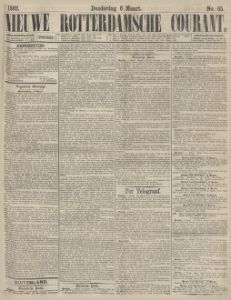About the day » Thursday March 6, 1862Calender converter
Born on Thursday March 6, 1862
- Doesburg, Wagenborgen († 1862)
- Anna Catharina Beerten, 3550 Zolder, Heusden-Zolder, Limburg, BE († 1925)
- Adriana Merton, Vianen († 1937)
- Aaltje Bles, Sintjohannesga, Schoterland, Friesland, Netherlands
- Aaldert Hofman, Apeldoorn († 1929)
- Adriana Stieltjes, Hoorn, Noord-Holland, Nederland
- Abraham Ledder, Nederhorst den Berg
- Aaltje Geerts Bles, St Johannesga, Schoterland, Friesland, Nederland († 1951)
- Abraham Willem de Vink, Leiden († 1944)
- Aart Kusters, Ophemert (Neerijnen) († 1865)
Died on Thursday March 6, 1862
- Antoinette Rijntjens (46), 's-Gravenhage
- Agatha van den Hooven, Maartensdijk
- (w) Homrighausen (0), Stünzel, Kreis Wittgenstein
- Arie Bekendam (48), Wieringen
- Agatha Overes (0), Alphen aan de Rijn
- Antonio Quirino Ferreira Lopes (82), Campanha, Minas Gerais, Brasil
- Aarnout Geel Verduijn (46), Goes (z)
- Aaltje ROMKES (0), Urk, Flevoland, Nederland
- Antonetta Rijntjens (46), 's-Gravenhage
- Annigje Zomer (2), Avereest, Overijssel, Nederland
Source: Delpher (KB | national library) Newspapers from March 6, 1862 at Delpher
- Dagblad van Zuidholland en 's Gravenhage
- De Noord-Brabanter : staat- en letterkundig dagblad
- Nieuwe Rotterdamsche courant : staats-, handels-, nieuws- en advertentieblad
- Algemeen Handelsblad
- Bredasche courant
- Nieuw Amsterdamsch handels- en effectenblad
- De Tijd : godsdienstig-staatkundig dagblad
- Rotterdamsche courant
- Utrechtsche provinciale en stads-courant : algemeen advertentieblad
- Nederlandsche staatscourant
Born on March 6
- 1841 » Viktor Burenin, Russian author, poet, playwright, and critic († 1926)
- 1849 » Georg Luger, Austrian gun designer, designed the Luger pistol († 1923)
- 1864 » Richard Rushall, British businessman († 1953)
- 1870 » Oscar Straus, Viennese composer and conductor († 1954)
- 1871 » Afonso Costa, Portuguese lawyer and politician, 59th Prime Minister of Portugal († 1937)
- 1872 » Ben Harney, American pianist and composer († 1938)
- 1879 » Jimmy Hunter, New Zealand rugby player († 1962)
- 1882 » F. Burrall Hoffman, American architect, co-designed Villa Vizcaya († 1980)
- 1882 » Guy Kibbee, American actor and singer († 1956)
- 1884 » Molla Mallory, Norwegian-American tennis player († 1959)
Died on March 6
- 1836 » Deaths at the Battle of the Alamo:
- 1854 » Charles Vane, 3rd Marquess of Londonderry, Irish colonel and diplomat, Under-Secretary of State for War and the Colonies (b. 1778)
- 1866 » William Whewell, English priest, historian, and philosopher (b. 1794)
- 1867 » Charles Farrar Browne, American-English author and educator (b. 1834)
- 1888 » Louisa May Alcott, American novelist and poet (b. 1832)
- 1895 » Camilla Collett, Norwegian novelist and activist (b. 1813)
- 1899 » Kaʻiulani of Hawaii (b. 1875)
- 1900 » Gottlieb Daimler, German engineer and businessman, co-founded Daimler-Motoren-Gesellschaft (b. 1834)
- 1905 » John Henninger Reagan, American surveyor, judge, and politician, 3rd Confederate States of America Secretary of the Treasury (b. 1818)
- 1905 » Makar Yekmalyan, Armenian composer (b. 1856)
Names that were popular for boys in 1862
Names that were popular for girls in 1862
Source: Wikipedia Historical events 1862
- Koning Willem III (Huis van Oranje-Nassau) was from 1849 till 1890 sovereign of the Netherlands (also known as Koninkrijk der Nederlanden)
- From March 14, 1861 till January 31, 1862 the Netherlands had a cabinet Van Zuijlen van Nijevelt - Loudon with the prime ministers Mr. J.P.P. baron Van Zuijlen van Nijevelt (conservatief-liberaal) and Mr. J. Loudon (liberaal).
- In The Netherlands , there was from February 1, 1862 to February 10, 1866 the cabinet Thorbecke II, with Mr. J.R. Thorbecke (liberaal) as prime minister.
- The Netherlands had about 3.6 million citizens.
- May 1 » American Civil War: The Union Army completes its capture of New Orleans.
- May 31 » American Civil War: Peninsula Campaign: Confederate forces under Joseph E. Johnston and G.W. Smith engage Union forces under George B. McClellan outside Richmond, Virginia.
- September 15 » American Civil War: Confederate forces capture Harpers Ferry, Virginia (present-day Harpers Ferry, West Virginia).
- November 7 » American Civil War: Union General Ambrose Burnside was assigned to command the Army of the Potomac in Antietam, Maryland. After Union General George B. McClellan refused to pursue Confederate General Robert E. Lee’s Army of Northern Virginia after their retreat from the Battle of Antietam.
- November 9 » American Civil War: Union General Ambrose Burnside assumes command of the Army of the Potomac, after George B. McClellan is removed.
- December 17 » American Civil War: General Ulysses S. Grant issues General Order No. 11, expelling Jews from parts of Tennessee, Mississippi, and Kentucky.
Weather March 6, 1862
The temperature on March 6, 1862 was about 2.7 °C. There was 0.7 mm of rain. The air pressure was 13 kgf/m2 and came mainly from the south-southwest. The airpressure was 75 cm mercury. The atmospheric humidity was 98%.

 March 5, 1862
March 5, 1862